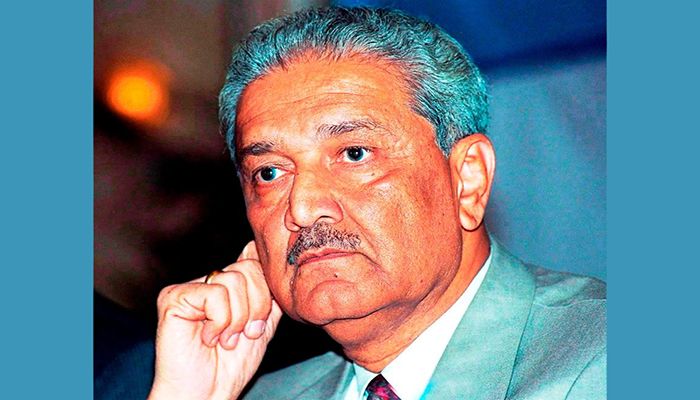
Desk Report
Publish: 11 Oct 2021, 06:23 pm

Abdul Qadeer Khan || Photo: Collected
Abdul Qadeer Khan, known as the "Father of Pakistan's
Nuclear Program," died on Sunday.
In Pakistan, he was praised for transforming the country into
the world's first Islamic nuclear power. However, the West saw him as a
dangerous renegade who was smuggling technology to rogue governments.
After being hospitalized with COVID-19, the nuclear physicist
died at the age of 85 in Islamabad, Pakistan's capital.
He was hailed as a national hero for bringing the country up
to atomic parity with India and for making the country's defenses "impregnable."
When he was accused of unlawfully proliferating nuclear
technology to Iran, Libya, and North Korea, he found himself in the crosshairs
of controversy.
After admitting to conducting a proliferation network to the
three countries, Khan was placed under house detention in Islamabad in 2004.
He was diagnosed with prostate cancer in 2006 and underwent
surgery, but he recovered.
In February 2009, a court lifted his house imprisonment, but
he was nonetheless closely monitored and accompanied by police whenever he left
his home in a quiet Islamabad neighborhood.
Crucial contribution
Khan was born in Bhopal, India, on April 1, 1936, and moved
to Pakistan with his family after the traumatic 1947 partition of the
subcontinent, which marked the end of British colonial control.
In 1960, he earned a bachelor's degree in science from
Karachi University, then went on to Berlin to study metallurgical engineering
before finishing postgraduate studies in the Netherlands and Belgium.
The procurement of a plan for uranium centrifuges, which
convert uranium into weapons-grade fuel for nuclear fissile material, was
critical to Pakistan's nuclear program.
He was accused of stealing it from the Netherlands and
bringing it back to Pakistan in 1976 while working for Urenco, an
Anglo-Dutch-German nuclear technical collaboration.
When Zulfikar Ali Bhutto returned to Pakistan, he put Khan in
charge of the government's fledgling uranium enrichment effort.
Khan later stated in a newspaper interview that his team had
enriched uranium by 1978 and was ready to explode a nuclear bomb by 1984.
Pakistan was hit with international sanctions after its
nuclear test in 1998, which threw its economy into freefall.
Khan's star began to fade in March 2001, when then-President
Pervez Musharraf dismissed him from the presidency of Kahuta Research
Laboratories and appointed him as a special adviser, purportedly under US pressure.
However, Pakistan's nuclear establishment had not anticipated
its most beloved hero to be questioned.
After receiving a letter from the International Atomic Energy
Agency, a UN watchdog, alleging that Pakistani scientists were the source of
sold-off nuclear knowledge, Islamabad took action.
Khan admitted to deals on foreign markets while constructing
Pakistan's nuclear program in an address to the Pakistan Institute of National
Affairs in 1990.
He explained, "It was not possible for us to manufacture
each and every piece of equipment within the country."
‘I saved the country’
After his confession, Musharraf pardoned Khan, but he later
withdrew his words.
"I saved the country for the first time when I made
Pakistan a nuclear nation, and I saved it again when I confessed and took full
responsibility," Khan said in an interview with the AFP news agency in 2008,
while under house arrest.
The physicist considered nuclear defense to be the most
effective deterrent.
In 1998, when Pakistan conducted atomic tests in retaliation
to Indian tests, Khan stated that Pakistan "never desired to create
nuclear weapons, but it was forced to do so."
Khan attempted his hand at politics nearly a decade ago,
creating the Tehreek-e-Tahafuz Pakistan (Save Pakistan Movement) in July 2012
in the hopes of gaining votes based on the respect he still commands in
Pakistan.
After none of its 111 candidates secured a seat in national
elections, he disbanded the party a year later.
In the same year, Khan sparked a new scandal when he claimed
in an interview with the Urdu newspaper Daily Jang that he provided nuclear
technology to two countries on the orders of Benazir Bhutto, the dead Pakistani
prime minister.
He didn't name the countries, and he didn't indicate when
Bhutto, the twice-elected Prime Minister who was slain in 2007, allegedly gave
the orders.
"I was not independent, but I was obligated to follow the prime minister's directives," he was quoted as adding.
The claim was dismissed by Bhutto's Pakistan Peoples Party as
"baseless and untrue."
He authored op-ed pieces for the popular Jang group of
publications on a regular basis, generally espousing the importance of scientific education.
His likeness can be found on the signs, stationery, and
websites of many schools, universities, institutes, and charity hospitals
across Pakistan.
Subscribe Shampratik Deshkal Youtube Channel
Topic : Abdul Qadeer Khan Pakistan
© 2024 Shampratik Deshkal All Rights Reserved. Design & Developed By Root Soft Bangladesh